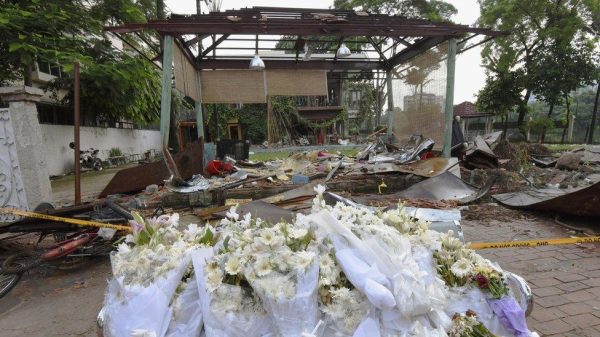Behind the Cyst: Families Facing Bangladesh’s Teen Gang Epidemic

- Update Time : Monday, February 24, 2025

When Indira Gandhi, the first foreign head of state to visit Bangladesh, concluded her historic trip, Bangabandhu Sheikh Mujibur Rahman, accompanied by Begum Mujib, went to the airport to bid her farewell. As Indira Gandhi approached Begum Mujib to say goodbye, Begum Mujib softly requested, “Please tell Kamal’s father to eat properly and take care of himself.”
Indira Gandhi, having studied at Shantiniketan, understood Bengali but could not speak it fluently. Confused, she wondered who “Kamal’s father” was and looked toward journalist M.R. Akhtar Mukul standing nearby. Mr Mukul explained to her that Bengali women typically avoid addressing their husbands by name, instead referring to them as the father of one of their children. Begum Mujib was essentially asking her to urge Bangabandhu—who had spent his entire life preoccupied with politics and the country—to pay attention to his own health and ensure he ate on time. She believed that Bangabandhu would listen if Indira Gandhi personally reminded him. Such gentle concern for a husband’s well-being, expressed indirectly through acquaintances, is common among Bengali women. Hearing this, Indira Gandhi remarked softly, “How wonderful Bengali housewives!”
A Wife’s Helplessness in Uttara
Recently , when members of a teenage gang in Uttara, Dhaka, attacked a man with sharp weapons, it was his wife (though later some media suggested they might not be husband and wife, but had another kind of relationship) who bravely stood between him and the attackers, repeatedly trying to shield him with her own body. No one else came forward to help. Observing this incident, I recalled Indira Gandhi’s comment to Begum Mujib about Bengali housewives. Questions about the exact relationship between this man and woman might remain, yet undeniably, Bengali housewives still regard their husbands’ lives above everything else.
Regardless of debates about this particular woman’s identity, it’s clear that for most Bengali wives, their husband remains the center of their universe. In recent years, society and the state have witnessed repeated instances of husbands falling victim to violence right before their wives’ eyes. No one can deny these tragic realities. Thus, when neither society nor state intervenes, how long can a wife protect her husband alone? Isn’t her helplessness a symbol of a greater social failure?
The Spread and Power Behind Teen Gangs
The menace of teenage gangs has spread far beyond the neighborhoods of Dhaka, engulfing the entire country. Earlier this year, I wrote about the escalating menace of teenage gangs nationwide. Shortly thereafter, even the head of government at that time dedicated a significant portion of a speech to the issue. Yet, the severity has not diminished in the slightest. A major reason was that influential local representatives—MPs, mayors, Upazila chairpersons, Union Parishad chairpersons, and even presidents and secretaries of local branches of the ruling party—were actively patronizing these gangs for their own political and financial interests. Consequently, the police and local administration were rendered helpless. I clearly stated this in my writing in early 2024.
Currently, those political figures and public representatives have fled. Even the leaders of the previously ruling political party are on the run. Yet teenage gangs continue to thrive. Reports about their activities appear regularly in newspapers, alongside widespread sharing of video clips on social media. Their continued powerful presence strongly suggests that the gangs have found new protectors, who are evidently just as influential as their predecessors, allowing these gangs to operate openly and confidently.

Understanding Teen Gangs through Rural Wisdom
Syed Mujtaba Ali, discussing the diplomatic strategies of Sheikh Mujibur Rahman and Zulfikar Ali Bhutto, once humorously wrote that Bhutto did not fully grasp diplomacy even though he had acquired a Western education from Britain. On the other hand, Sheikh Mujib’s diplomacy was clear; because Mujib, as a village boy, knew simply “how much rice comes from how much paddy.” Most Bangladeshis still originate from villages, and even today, the country—formerly East Bengal—remains largely rural at heart. Therefore, when rural Bangladesh sees the brazen behavior of these teenage gangs, they clearly understand the situation through a village proverb: “If you press just one grain of rice from a pot on the stove, you immediately know the condition of the entire pot.” Educated urban dwellers might overlook the shift in control, but rural people can instantly sense that while the names have changed, the same corrupt systems persist.
The Unbearable Helplessness of Families
Nonetheless, without delving into the entire spectrum of social decay, it’s clear that because the patrons have merely shifted, teenage gangs will remain. The powerful will always nurture them. Yet the helplessness faced by the parents whose children become gang members is unbearable.
When normal pathways or the power structures of society and state fail to solve problems, certain individuals and families must find alternative methods of survival. The oldest life form on Earth teaches us this survival strategy. When the primitive amoeba faces threats from stronger enemies or a hostile environment, it builds a tough protective wall around its body—a condition known in biology as the “amoeba’s cyst.” This cyst enables the amoeba to endure adverse conditions.

The Amoeba’s Cyst for Survival
Across the world, whenever minority groups find their culture, resources, or lives threatened by dominant groups or hostile states, they similarly build metaphorical “cysts” around themselves, isolating themselves within protective barriers. Once conditions become favorable again, they emerge from these self-imposed protective shells, just like the amoeba.
Before forming such a cyst, the amoeba carefully assesses which direction the threats are coming from. Likewise, families in Bangladesh—particularly those whose children risk becoming involved in teenage gangs—must recognize clearly which hostile environments compel them to create their own protective barriers, much like the amoeba’s cyst.
Every Family Must Protect Their Children
Every family and indeed every citizen realizes that state power and the politics supported or nurtured by state power are turning adolescents and young adults into members of teenage gangs. Families must therefore build protective walls around their children to ensure they do not stray into these dangerous territories.
However, beyond state-backed political power, several other issues have exacerbated this problem. For example, during the two-year COVID disruption, a large segment of students drifted away from studies due to prolonged school closures. While the time passed without educational progress, their lack of actual learning was overlooked, and they were hurriedly passed through brief, token examinations—which were hardly real tests at all.
The Crisis in Education
This approach has spread like a contagious disease throughout Bangladesh, from schools up to universities, encouraging a culture of passing without genuine study or assessment. The extreme consequences of this are now becoming starkly visible.
Rasheda K. Choudhury, a former advisor to the caretaker government who has worked extensively on education in Bangladesh, pointed out that no recent educational policies have been thoughtfully planned. Instead, decisions have been reactionary, driven by demands. A closer look at these demands reveals a disturbing trend: an increasing apathy among students toward studying and taking genuine examinations.
If teenagers and young adults neglect their education, they inevitably become misguided. Misguided youth are capable of any wrongdoing, easily manipulated to serve various interest groups. The devastating emotional toll on their families, and the enormous burden on society and the state, will soon become painfully apparent. These consequences will linger for years, burdening the nation deeply.
What is Fueling Gangs?
Beyond educational institutions, another group of uneducated teenagers and youths is joining these gangs primarily because of unemployment. Unemployment has been steadily rising, exacerbated in recent months by the closure of numerous factories and small businesses nationwide. A significant number of youths have become unemployed. As a rural Bengali proverb aptly puts it, “An idle brain is the devil’s workshop,” and these idle minds are increasingly turning toward destructive behavior.

Families: Facing Reality Alone
Yet, sometimes a family must prioritize itself above the broader society and state. For the sake of their own survival and their children’s well-being, families must adopt the strategy of the amoeba’s cyst—building protective walls in hostile environments.
Indeed, against the vast tide of society and state, an individual family or a pair of parents stands helplessly on the shores of an ocean of despair. A Bengali housewife, with overwhelming vulnerability larger than the vastness of the ocean itself, courageously tries to shield her husband from danger. For these families, at this critical juncture, is there any path other than the one chosen by the helpless Bengali housewife—standing alone against insurmountable odds?
The only path remaining is the amoeba’s strategy: creating a cyst and hiding behind its protective walls. Perhaps some may recall the words of Lalon: “When time is gone, spiritual striving achieves nothing.” But when times are harsh and heavy, doesn’t spiritual striving itself hide deep within stone-like silence?
Author: State-awarded journalist, Editor of Sarakhon and The Present World.











Leave a Reply